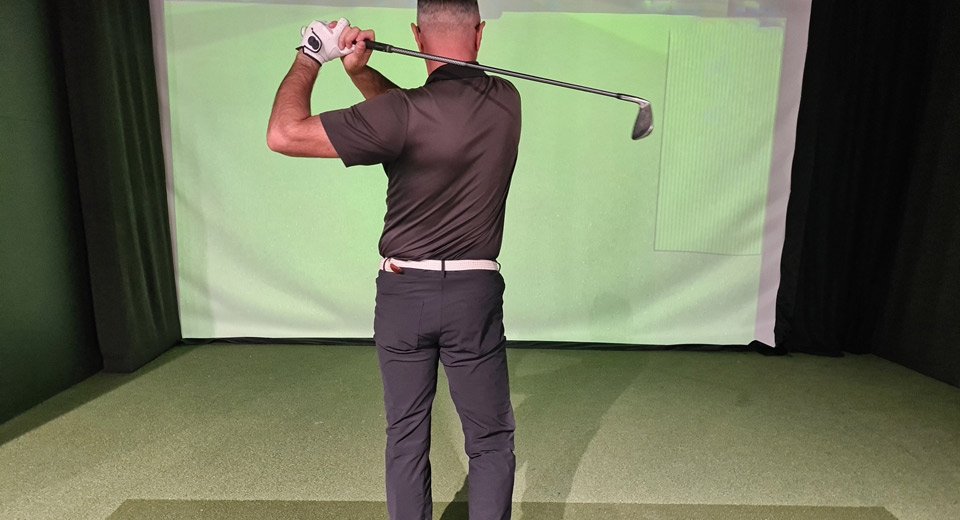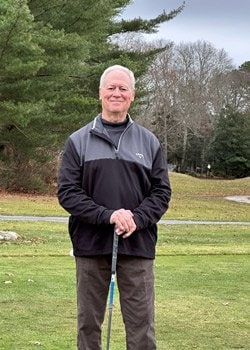Retired veterinarian finds his swing at Golf Performance Center

Dave Romeiser almost gave up golf several times.
“It was almost like I had a short-term memory,” said Romeiser, 68, who lives in Sandwich. “I could take the lesson out on the course, and then if I didn’t practice, it would be gone. And I was very frustrated with it.”
During his career as a veterinarian in Barnstable and Sandwich, Romeiser didn’t have much time for golf. But after retiring, he realized how much he enjoyed it and decided to focus on what he now calls an obsession.
But he was frustrated by a lack of flexibility and rotation in his swing. When he tried to fix his swing himself, he managed to strain his hip flexors and was referred to a physical therapist and eventually discovered the Cape Cod Healthcare Golf Performance Center in Hyannis, where Catherine Hoell, a physical therapist and Titleist Performance Institute (TPI) certified trainer, works with golfers on body mechanics and movement. The self-pay program is individualized to match each client’s requirements.
“I jumped into the program,” said Romeiser, who had a 23 handicap and felt lucky to break 100. He opted for the center’s Master’s level program, featuring a dozen 45-minute sessions at a cost similar to private golf lessons. “I [had] a lot of golf lessons under my belt, but I didn’t have any kind of instruction on balance and strength and flexibility.”

Hoell, who works with clients at Cape Cod Healthcare's Golf Performance Center at 46 North St. in Hyannis, and Matthew DiBona, a physical therapist at Falmouth Hospital, are both certified through TPI, created by Titleist to train medical clinicians and others on how body mechanics affect the game of golf. Hoell, an accomplished golfer herself, compares the TPI sessions to looking under the hood of a car and tinkering with the engine. The TPI program is different from most standard golf lessons, she said, in that it addresses how someone’s ability to hit the ball is affected by factors such as body mechanics, pain and/or flexibility. It addresses the “why” of how a golfer plays. And it works for golfers of all levels, she said.
“A teaching pro can say, ‘Oh, it looks like you're not taking the club back enough. Take the club back further.’ But if you physically can't do that, there is no way that is going to help you,” she said. “You've got to physically have the engine power to do that.”
New Recovery Center
The Cape Cod Healthcare Golf Performance Center has assessment tools such as strength-building equipment, video analysis and a biofeedback K-Vest that measures motion, flexibility, strength, range of motion, balance, coordination and power. The therapists can also do manual treatments, such as massage, active release stretching, therapeutic cupping and dry needling, which involves the therapist inserting tiny needles into pressure points to help with pain and movement. And Hyannis has a new Recovery Center – a room dedicated to these manual therapies.
“The treatment room provides a space where golfers, clients, can receive the latest PGA golf tour-quality modalities to help them feel better and play better on and off the course,” Hoell said. “It's like stepping into the trailer – the physio trailer that's in the back of every parking lot of a tour event where the pros walk in and they have a golf specialist work with them.”
A golfer might start in the Recovery Center doing some stretching or mobilization and then step into the larger room to warm up with some movement corrective exercises and a little bit of strengthening before hitting some balls, Hoell said.
“It’s all customized,” she said. “And there's nowhere on Cape that has this full service. We brought all of that together.”
Age and Physicality Considered
Romeiser liked the performance program because it took his age and physicality into account. Although he played golf as a youngster, he was more focused on football and soccer. Coming into golf later in life, he didn’t have a good understanding of what was required, he said.
“I didn't understand why people would play golf,” he said. “I did not think that it was an athletic sport, but I was totally wrong.”
With Hoell, he worked on stretching and balance and using his core muscles. It definitely seemed to make a difference, he said. But then a rotator cuff injury – incurred while indulging in his other passion, skiing – killed his golf game for a while. That said, he’s already spoken with Hoell to see if when he’s ready, she can help him get back to golf.
More information about Cape Cod Healthcare’s Golf Performance Center is available by calling 508-957-9283 or visiting the center website.
